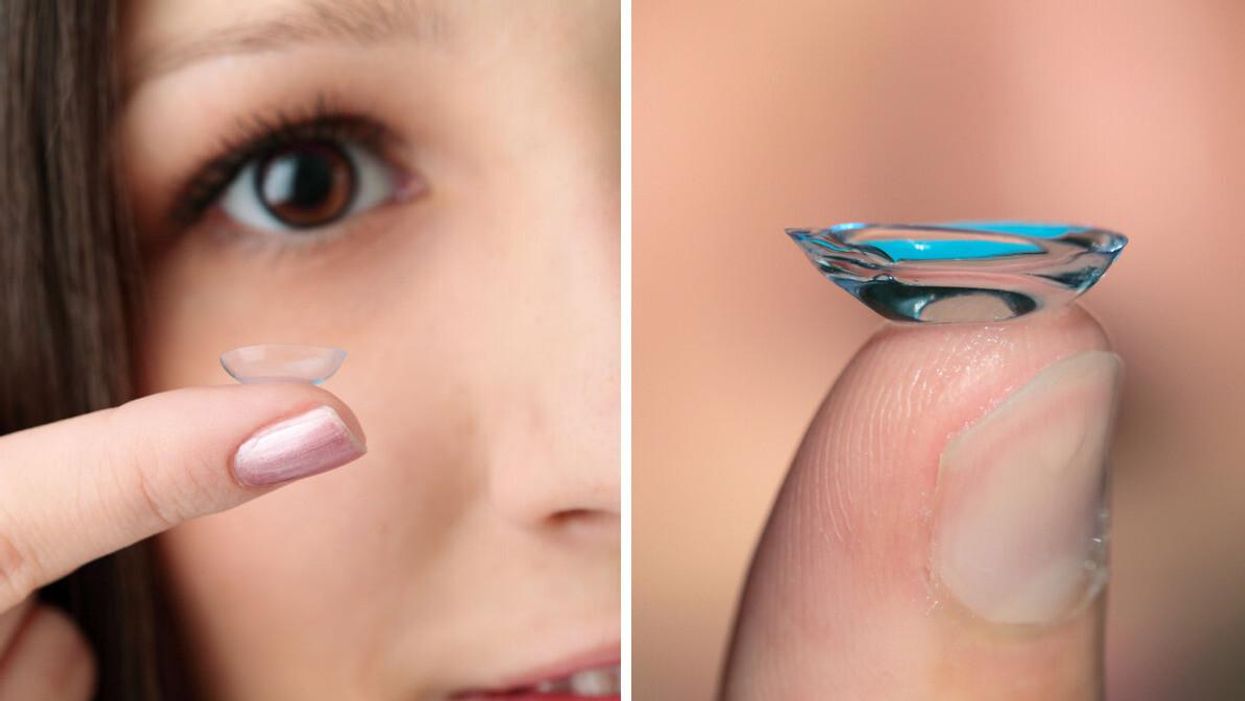6 Things Contact Lens Wearers Should Never Do According To An Eye Doctor
Don’t be that patient with lost contacts in your eye! 👀

Woman with contact lens on finger. Right: Close-up of contact lens on finger.
A California ophthalmologist gave us her top tips for protecting your eyes while using contacts after she removed 23 contact lenses from a patient who could've used this advice herself.
Dr. Katerina Kurteeva says a woman going through a rough phase was complaining of eye pain when she came to see her in September 2022. What the eye specialist found in her eye was even beyond her wildest expectations.
This article contains graphic content that might not be suitable for some readers.
Dr. Kurteeva posted a video on Instagram of the procedure and it has since gone viral.
eye specialists around the world are using her video as a teaching tool.
Here are the six things Kurteeva says you should never do when it comes to taking care of your contact lenses.
Never sleep in your contact lenses
The number one message from Kurteeva is simple: never sleep in your contacts.
The doctor says that’s because contacts are a piece of plastic and a foreign body on your cornea.
“When the contact lens is on it basically blocks that access to normal ingredients for cellular function,” she told Narcity. “When you remove the contact lens at night, that is the chance for the cornea to kind of recover and get a deep breath of oxygen.”
Give your eyes a break for at least 8 to 10 hours, she adds.
If you accidentally slept with your contacts in, remove them when you wake up and give your eyes a break by wearing glasses for the day.
“It's not healthy for the eye, [people] will definitely will feel irritation, they will feel the vision will be blurry because remember, the cornea needs to breathe,” Kurteeva notes. “When it doesn't breathe, it becomes swollen and adenomatous which results in blurry vision and also mucus production.”
If you wake up and your eyes are red and irritated even after removing your contacts, Dr. Kurteeva recommends going to see your eye doctor to make sure everything is okay.
Don't forget to wash your hands
Properly handling your contacts is super important.
The first step is washing your hands with soap and water before putting your contacts in or taking them out.
You don't want to get dirt in your eye that can cause irritation, Dr. Kurteeva says.
Don't skip artificial tears when handling contact lenses
The ophthalmologist recommends using artificial tears before and after removing your contacts.
The eye drops will keep your eyes hydrated and feeling their best. Just make sure you get a brand that is suitable for contact lenses!
Don't forget to disinfect your contact lenses
Disinfecting and storing your contacts properly overnight are also habits you want to get right.
Don't store your contacts in water or a saline solution.
It's important to get a suitable contact lens solution that will disinfect your lenses before they are stored for the night, the doctor says.
Just make sure you read the instructions on the bottle because some solutions like Clean Care have hydrogen peroxide, which means you need to leave the contact lenses in the solution for at least six hours to allow the neutralizing process to finish.
If you use daily contacts then the process is even easier because all you need to do is throw them out each night.
Get your contact lenses fitted by an optometrist
Dr. Kurteeva stresses the importance of getting your lenses fitted by an eye doctor and this could require some trial and error.
This will ensure that your eyes are comfortable throughout the day.
"I think most of the professional community is transitioning patients to daily contacts because they're thin, they're easily tolerated, they don't cause inflammatory reactions in the eyelids,” she adds.
Don't forget to go for regular eye exams
How often you should get an eye exam depends on several factors, including age and health.
The Canadian Association of Optometrists recommends an exam every two to three years for people between the ages of 20 to 39 years old.
However, if you wear contact lenses and glasses then that check-up should be more frequent.
"At least once a year where they [optometrists] will check your prescription, look at the eye surface, make sure you're not developing dry eye or abnormal corneal reaction," Dr. Kurteeva says.
When it comes to your eye health, experts agree it's important to ensure you are following healthy habits when wearing contact lenses so you don't risk getting an infection or worse.
This article's cover image was used for illustrative purposes only.